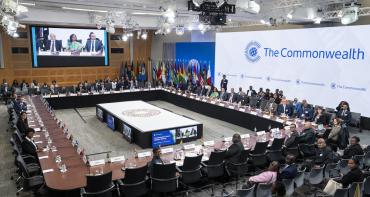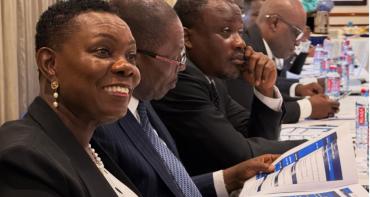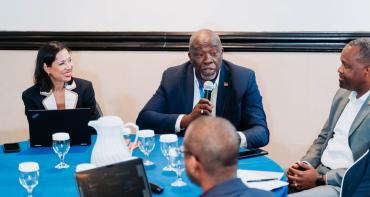“There is an emerging dynamism on the African continent. Purposefulness and energy are the new face of Africa” – Commonwealth Deputy Secretary-General Ransford Smith
Africa is at a defining period of development and the Commonwealth will play a role in sustaining and deepening the momentum, Deputy Secretary-General Ransford Smith said on 15 June 2011.
Some 19 of the Commonwealth’s 54 members are from Africa and a number of them were recognised as the new frontiers of economic growth, Mr Smith told an audience at the School of Finance and Banking in the Rwandan capital Kigali on the third day of a five-day visit to the east African country.
During the visit, Mr Smith held discussions with senior government ministers and officials, focusing on how the Commonwealth can assist Rwanda in tackling some of its economic challenges. These included Minister of Finance and Economic Planning John Rwangombwa and central National Bank of Rwanda Governor Claver Gatete.
The Deputy Secretary-General was positive about Africa’s prospects.
But he said critical to sustaining the economic growth momentum in Africa was adherence to Commonwealth values and principles, such as good and accountable governance, the rule of law and respect for human rights.
“This role must be informed by, and anchored in, the Commonwealth’s defining virtue as an association of values that are both conducive to, and promote democracy and development,” Mr Smith, a Jamaican, told the 500-strong audience of diplomats, academics, politicians, civil society and students.
Mr Smith said that while the African continent had not achieved the seven per cent growth rate viewed as necessary to achieve the Millennium Development Goals (MDG), it was not too far off the pace, growing at an average six per cent a year between 2001 and 2008. He said it was necessary for the growth to transition into sustained inclusive development.
Mr Smith called for concerted efforts by Africans and donor governments to tackle “stubborn facts” that negatively impacted Africa’s growth. He said these were “the increasing number of the poor, inadequate infrastructure, high unemployment, deficits in governance, and shortfalls in attaining the Millennium Development Goals”.
He also noted that despite the rapid growth, Africa’s economies remained among the least diversified in the global community, with 80 per cent of exports coming from oil, minerals and primary agricultural goods.
He noted that 60 per cent of Africa’s workforce was employed in the agricultural sector, which nevertheless contributed less than 30 per cent of growth.
“This statistic shows that agriculture is under performing. But I believe that Africa will diversify and that services – like banking and telephony – will ultimately become the frontier of growth.”
To put Africa’s growth in perspective, Mr Smith said that over the past 30 years, China’s real gross domestic product had doubled every seven to eight years, national income had increased sixteen fold, and a billion of its citizens had been lifted out of poverty.
“If rather than looking back we can look forward 30 years, the scale of the potential transformation and the resulting impact on Africa and the global community will be massive,” Mr Smith said.
Mr Smith highlighted areas in which the Commonwealth could assist Africa in its growth trajectory, including trade policy formulation and negotiation, export development strategies, public sector development and reforms and meeting MDG targets in health and education.
Other areas he cited were strengthening oversight institutions such as the Office of the Ombudsman, human rights bodies, anti-corruption agencies, the Office of the Auditor-General, parliamentary committees and election management bodies.
He said the Commonwealth was assisting Africa in enabling gender equality and equity, strengthening Information Communication Technology capabilities, and developing regulatory and legal frameworks for natural resource exploitation.



